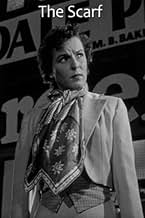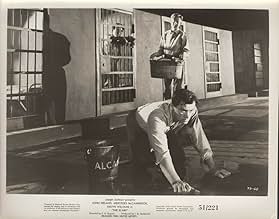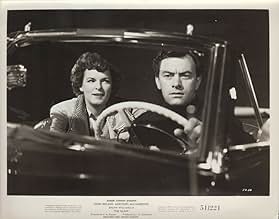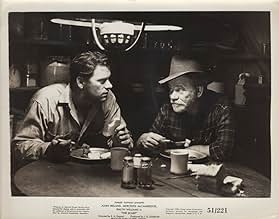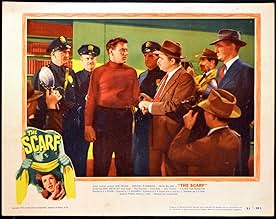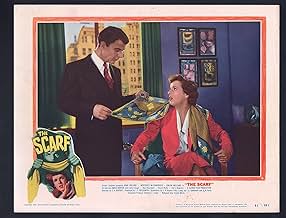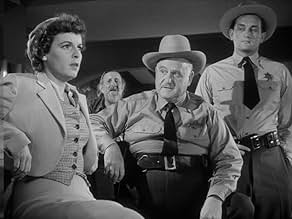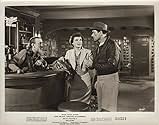A man believed to have murdered a woman, escapes from the insane asylum to find if he was the one who actually killed her using the scarf she was wearing.A man believed to have murdered a woman, escapes from the insane asylum to find if he was the one who actually killed her using the scarf she was wearing.A man believed to have murdered a woman, escapes from the insane asylum to find if he was the one who actually killed her using the scarf she was wearing.
- Director
- Writers
- Stars
- Awards
- 2 wins total
David Bauer
- Level Louie
- (as David Wolfe)
Iris Adrian
- Floozy
- (uncredited)
Richard Alexander
- Barfly
- (uncredited)
Barry Brooks
- Hospital Prison Guard
- (uncredited)
King Donovan
- Piano Player
- (uncredited)
John Frederick
- Deputy
- (uncredited)
Frank Hagney
- Floozy's Boyfriend
- (uncredited)
Frank Jaquet
- Town Sheriff
- (uncredited)
Frank Jenks
- Tom
- (uncredited)
Chubby Johnson
- Feed Store Manager
- (uncredited)
Tom Kennedy
- Asylum Inmate
- (uncredited)
- Director
- Writers
- All cast & crew
- Production, box office & more at IMDbPro
Featured reviews
Unfortunately being a psychiatrist myself kind of ruined this movie content wise (the first part where insanity is debated--shows only people who know absolutely nothing of mental illness). But maybe that was the point as John Ireland hadn't a trace of mental illness--just some sort of PTSD and amnesia.
The British Doctor as the paranoid schizophrenic was a stupid cartoon version but much closer the mark and what most B audiences would view as mental illness (fortunately this idiotic denouement only lasts for about the last 5 minutes of the movie.)
John Ireland is very handsome and the movie clips right along...the other two actors--the philosopher turkey farmer especially and the barmaid are very sympathetic characters as well.
It is very competently filmed and worth a watch. Leagues above the average B movie. Ignore the actual content of philosophy. I once heard that a good educated British accent reading a phone directory sounds intellectual to the average American; this is the same sort of effect you have in this film...just enjoy the flow of the movie and imagine deep things are being said.
RECOMMEND
The British Doctor as the paranoid schizophrenic was a stupid cartoon version but much closer the mark and what most B audiences would view as mental illness (fortunately this idiotic denouement only lasts for about the last 5 minutes of the movie.)
John Ireland is very handsome and the movie clips right along...the other two actors--the philosopher turkey farmer especially and the barmaid are very sympathetic characters as well.
It is very competently filmed and worth a watch. Leagues above the average B movie. Ignore the actual content of philosophy. I once heard that a good educated British accent reading a phone directory sounds intellectual to the average American; this is the same sort of effect you have in this film...just enjoy the flow of the movie and imagine deep things are being said.
RECOMMEND
John Ireland stars with Mercedes McCambridge in "The Scarf" which features Emlyn Williams and Lloyd Gough.
Ireland plays an escapee from a mental institution who is sure he didn't strangle his girlfriend with a scarf, but unfortunately, he can't remember anything. He hides out in a cabin owned by an isolated old man (Ezra Thompson), helps out raising his turkeys, and eventually goes to Los Angeles to see his friend David Dunbar (Williams), a psychiatrist. Along the way, he picks up a hitchhiker (McCambridge) en route to a job as a singing waitress. She's wearing the exact same scarf, but he still can't remember strangling his girlfriend.
This is a fairly convoluted story, cashing in on the interest in psychiatry after World War II. Ireland looks very handsome here and does a good job in this small movie. The character of Ezra, the old man, is interesting and likable.
This may sound silly, but for some reason, McCambridge singing "Summer Rains" was the high point of the film for me. I thought she really created an atmosphere with it and raised the level of the film.
Decent performances, but check this film out for McCambridge.
Ireland plays an escapee from a mental institution who is sure he didn't strangle his girlfriend with a scarf, but unfortunately, he can't remember anything. He hides out in a cabin owned by an isolated old man (Ezra Thompson), helps out raising his turkeys, and eventually goes to Los Angeles to see his friend David Dunbar (Williams), a psychiatrist. Along the way, he picks up a hitchhiker (McCambridge) en route to a job as a singing waitress. She's wearing the exact same scarf, but he still can't remember strangling his girlfriend.
This is a fairly convoluted story, cashing in on the interest in psychiatry after World War II. Ireland looks very handsome here and does a good job in this small movie. The character of Ezra, the old man, is interesting and likable.
This may sound silly, but for some reason, McCambridge singing "Summer Rains" was the high point of the film for me. I thought she really created an atmosphere with it and raised the level of the film.
Decent performances, but check this film out for McCambridge.
Two years after appearing in All The King's Men, John Ireland and Mercedes McCambridge reunite in The Scarf. Talented actors both, neither of them would enjoy, in number or in quality, movie roles commensurate with their gifts. A recondite find today, The Scarf could hardly have been much less so in 1951; under the `Gloria Productions' imprint, it fell to a German-born director of little reputation, E.A. Dupont.
But while not every emigrant from middle Europe was a Fritz Lang or Robert Siodmak or Billy Wilder, most had tradition behind them and a touch of inspiration, like John Brahm and Edgar G. Ulmer and even Dupont. Though The Scarf starts off dead slow a long, quasi-philosophical dialogue between a turkey-ranching hermit in the California desert (James Barton) and an escapee from an asylum for the criminally insane who has sought refuge with him (Ireland) soon enough the movie picks up its pace and shows flashes of originality and style. The cinematography is by Frank (Franz) Planer, another refugee steeped in Expressionism who had behind, and ahead of, him several noirs.
Not coincidentally, the quickened pace comes with McCambridge's arrival, as a singing bar waitress who hitches a ride with Ireland. With her distinctive organ-pipe voice and her instinct for biting off her lines clean, she brings both quirkiness and force to this standard role (tough gal, good heart). Though some of her best known roles showed noir influences (All The King's Men, Johnny Guitar) she only appeared in two obscure noirs (Lightning Strikes Twice was the other). The cycle is poorer for her rarity.
The Scarf's plot, alas, falls under the rubric far-fetched. It involves Ireland's not quite remembering the crime for which he was committed strangling a girl with her scarf and a sinister psychologist ( Emlyn Williams) somehow in the employ of Ireland's powerful father. Dupont can't do much with the bulk of it (who could?), but along the way sneaks in some arresting sequences. The best occurs when McCambridge has been ordered to leave town on the 11 p.m. bus for Los Angeles; as she vacillates, looking down the dark road at the sign reading `sheriff's station,' it turns into a lure for her to sell out Ireland for the reward on his head, with `$5000" spelled out in beckoning neon.
But while not every emigrant from middle Europe was a Fritz Lang or Robert Siodmak or Billy Wilder, most had tradition behind them and a touch of inspiration, like John Brahm and Edgar G. Ulmer and even Dupont. Though The Scarf starts off dead slow a long, quasi-philosophical dialogue between a turkey-ranching hermit in the California desert (James Barton) and an escapee from an asylum for the criminally insane who has sought refuge with him (Ireland) soon enough the movie picks up its pace and shows flashes of originality and style. The cinematography is by Frank (Franz) Planer, another refugee steeped in Expressionism who had behind, and ahead of, him several noirs.
Not coincidentally, the quickened pace comes with McCambridge's arrival, as a singing bar waitress who hitches a ride with Ireland. With her distinctive organ-pipe voice and her instinct for biting off her lines clean, she brings both quirkiness and force to this standard role (tough gal, good heart). Though some of her best known roles showed noir influences (All The King's Men, Johnny Guitar) she only appeared in two obscure noirs (Lightning Strikes Twice was the other). The cycle is poorer for her rarity.
The Scarf's plot, alas, falls under the rubric far-fetched. It involves Ireland's not quite remembering the crime for which he was committed strangling a girl with her scarf and a sinister psychologist ( Emlyn Williams) somehow in the employ of Ireland's powerful father. Dupont can't do much with the bulk of it (who could?), but along the way sneaks in some arresting sequences. The best occurs when McCambridge has been ordered to leave town on the 11 p.m. bus for Los Angeles; as she vacillates, looking down the dark road at the sign reading `sheriff's station,' it turns into a lure for her to sell out Ireland for the reward on his head, with `$5000" spelled out in beckoning neon.
The Scarf (1951)
A peculiar but sometimes charming movie, filled with empty moments, people sitting and talking, the wind whistling through trees in the desert, and a possible killer on the loose. The best parts for me were the odd pairing of a loner woman played by Mercedes McCambridge and the leading man on the run, John Barrington (John Ireland). Later, both of these characters appear in different places, sometimes crossing paths. McCambridge is a sharp, funny, slightly tragic actress, and Ireland is a super sweet guy. They make a surprising pair.
The setting for all this is a nice little village on the edge of the desert, and a dry turkey farm out of town. As Barrington suffers with his guilt and doubts about having committed a murder (strangling someone with a scarf), he bounces from place to place, just barely avoiding trouble. People are rough and Barrington can't get his head together, but he plugs along, butting against McCambridge at times, and the tensions grows before you realize it.
It isn't quite a Hitchcockian innocent man on the loose. We doubt him, too. We are unravelling the problem as they go. It isn't always a remarkable unfolding of events, but it has remarkable moments, and a strange, spare mood that is possessing. At first I almost stopped watching it because it was a bit clumsy and raw, but that becomes smoother and more essential over time. Eventually it becomes downright idiosyncratic in the best ways, just on the happy edge of weird. There's even a barroom scene with McCambridge singing a simple blues song, pretty amazingly.
The plot takes on some forced twists toward the end, but they are still dramatic ones. "The doctor is allergic to irrelevant laughter."
A peculiar but sometimes charming movie, filled with empty moments, people sitting and talking, the wind whistling through trees in the desert, and a possible killer on the loose. The best parts for me were the odd pairing of a loner woman played by Mercedes McCambridge and the leading man on the run, John Barrington (John Ireland). Later, both of these characters appear in different places, sometimes crossing paths. McCambridge is a sharp, funny, slightly tragic actress, and Ireland is a super sweet guy. They make a surprising pair.
The setting for all this is a nice little village on the edge of the desert, and a dry turkey farm out of town. As Barrington suffers with his guilt and doubts about having committed a murder (strangling someone with a scarf), he bounces from place to place, just barely avoiding trouble. People are rough and Barrington can't get his head together, but he plugs along, butting against McCambridge at times, and the tensions grows before you realize it.
It isn't quite a Hitchcockian innocent man on the loose. We doubt him, too. We are unravelling the problem as they go. It isn't always a remarkable unfolding of events, but it has remarkable moments, and a strange, spare mood that is possessing. At first I almost stopped watching it because it was a bit clumsy and raw, but that becomes smoother and more essential over time. Eventually it becomes downright idiosyncratic in the best ways, just on the happy edge of weird. There's even a barroom scene with McCambridge singing a simple blues song, pretty amazingly.
The plot takes on some forced twists toward the end, but they are still dramatic ones. "The doctor is allergic to irrelevant laughter."
The previous reviewer said it was a shame this film was never shown on any cable channels. I just saw it today on TCM (Turner Classic Movies). I had never seen it before, and have to agree it is a great example of the films noir of the '50s. There is a lot of suspense in the film with a "did he do it or not?" theme, where the protagonist has a loss of memory and can't recall the crime. Mercedes McCambridge is excellent in the film, and the bar scenes give us lots of the '50-era atmosphere. There are so few movies with Mercedes McCambridge that one can see anymore, so this movie is a treat if only for being able to see her. So don't give up hope. TCM's website is a great source for info on classic movies, and you can look up the dates and times they will be showing this film again.
Did you know
- TriviaLevel Louie's Bar is apparently in the 500 block of South Main Street, as the Gayety Theatre @ 523 South Main is directly across the street, thanks to a rear projection visible in several shots. The names of Randolph Scott and Don Ameche appear on the marquee; it was the Gayety's policy of listing the players rather than the titles of the films, on their readerboard.
- GoofsWhen Ezra tells the Sheriff and others that his turkeys were disturbed about two hours beforehand, it would be expected that they would investigate to try and find tracks where Barrington had been and to see what direction he had taken away from the farm. Instead they just say good night and leave.
- Quotes
Ezra Thompson: I came here fifteen years ago to be by myself. Haven't got a mirror in the place. Even my own reflection's too much company. Let me tell you something, you're either a fool, or you're bats. Does the word 'bats' means anything to you outside of baseball?
- ConnectionsReferences The Man Who Came to Dinner (1941)
- SoundtracksSummer Rains
Music and lyrics by Sammy John DeFazio, Charles Milton Daniels (as Charles Milton Daniel) and Gilbert Hugh Hall
Performed by Mercedes McCambridge (uncredited)
[Connie sings the song several times at Level Louie's]
- How long is The Scarf?Powered by Alexa
Details
- Runtime1 hour 33 minutes
- Color
- Aspect ratio
- 1.37 : 1
Contribute to this page
Suggest an edit or add missing content


